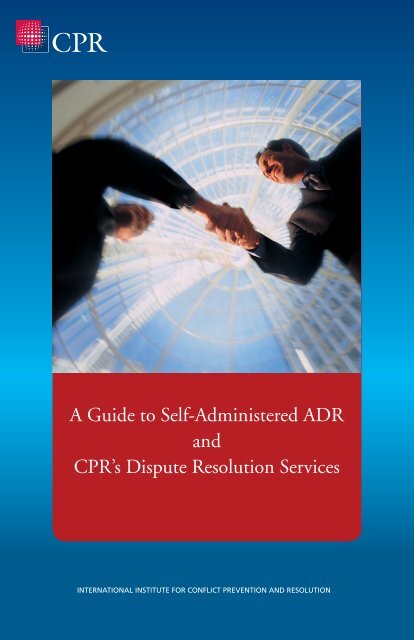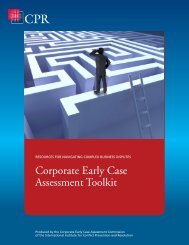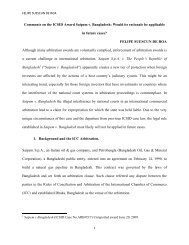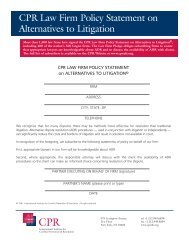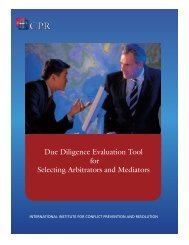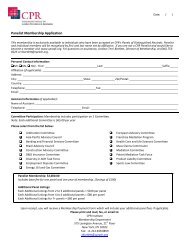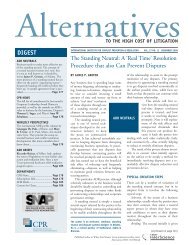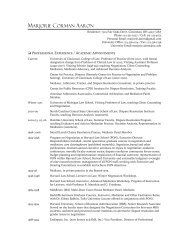CPR's Guide to Self-Administered ADR - CPR Institute for Dispute ...
CPR's Guide to Self-Administered ADR - CPR Institute for Dispute ...
CPR's Guide to Self-Administered ADR - CPR Institute for Dispute ...
You also want an ePaper? Increase the reach of your titles
YUMPU automatically turns print PDFs into web optimized ePapers that Google loves.
A <strong>Guide</strong> <strong>to</strong> <strong>Self</strong>-<strong>Administered</strong> <strong>ADR</strong><br />
and<br />
<strong>CPR</strong>’s <strong>Dispute</strong> Resolution Services<br />
International <strong>Institute</strong> <strong>for</strong> Conflict Prevention and Resolution
Introduction<br />
With litigation costing companies billions of dollars each year, the effective<br />
management of conflict is essential <strong>to</strong> reduce costs, lower risks and improve<br />
business relationships. Mediation, arbitration and other consensual methods<br />
offer a low-cost, high-return option <strong>for</strong> corporations and their outside counsel.<br />
However, parties often complain about the excessive costs and inefficiencies that<br />
are inherent in traditional administered <strong>ADR</strong> proceedings. This is especially true<br />
<strong>for</strong> complex commercial cases with billions of dollars at issue.<br />
<strong>CPR</strong> specializes in these large-scale disputes and has developed proprietary<br />
self-administered processes <strong>to</strong> empower parties and expedite resolution.<br />
Refined over three decades, <strong>CPR</strong>’s self-administered approach <strong>to</strong> arbitration<br />
and mediation provides a vehicle <strong>for</strong> parties <strong>to</strong> conduct a proceeding without<br />
the unnecessary intervention of an administering body.<br />
For complex business matters, <strong>CPR</strong>’s approach assures:<br />
• Cost Savings: Because the proceedings are directly administered by the<br />
neutrals, the parties pay no administrative fees <strong>to</strong> <strong>CPR</strong> – significantly lowering<br />
the overall cost of resolving the dispute.<br />
• Control: The parties are in complete control of the neutral selection process<br />
but may request highly-cus<strong>to</strong>mized selection assistance when needed.<br />
• Efficiency: Once selected, the neutral can quickly agree on procedures<br />
and schedules with the parties, with no intervention of third-party<br />
administrative staff.<br />
• Flexibility: Parties maintain maximum ability <strong>to</strong> create a resolution process<br />
that best suits their dispute and the freedom <strong>to</strong> amend it in order <strong>to</strong> meet<br />
specific circumstances.<br />
<strong>CPR</strong>’s methodology also includes a broad spectrum of available related services,<br />
resources and <strong>to</strong>ols, including panels of neutrals, clauses and rules, and drafting<br />
<strong>to</strong>ols. This guide will describe <strong>CPR</strong>’s approach in more detail and explain how <strong>to</strong><br />
best take advantage of our numerous services <strong>to</strong> achieve your business priorities.
A <strong>Guide</strong> <strong>to</strong><br />
<strong>Self</strong>-<strong>Administered</strong> Processes<br />
Alternative <strong>Dispute</strong> Resolution (<strong>ADR</strong>) is a collection of procedures,<br />
typically mediation and arbitration, used <strong>for</strong> the purpose of resolving<br />
disputes more efficiently and at a lower cost. When corporations utilize<br />
<strong>ADR</strong> methods, they can avoid expensive and time-consuming trials.<br />
<strong>ADR</strong> also encourages creativity, helps parties find practical business-centric<br />
solutions, and avoids the unpredictability involved with traditional<br />
dispute resolution mechanisms. The process usually results in improved<br />
communications between parties and is, there<strong>for</strong>e, better <strong>for</strong> ongoing<br />
business relationships.<br />
There are different methods <strong>for</strong> conducting <strong>ADR</strong> proceedings, based on<br />
the level of control the parties would like over the process. In deciding<br />
which process <strong>to</strong> use, parties should consider the amount of support<br />
necessary <strong>for</strong> the matter and how much they are willing <strong>to</strong> spend on the<br />
administrative elements of the case.<br />
1. <strong>Administered</strong><br />
An administered approach requires the active involvement of a<br />
separate administering entity as a matter of course throughout the<br />
process. <strong>Administered</strong> <strong>ADR</strong> occurs under the auspices of a court or an<br />
independent <strong>ADR</strong> entity that functions much like a clerk by arranging<br />
and managing conduct of the <strong>ADR</strong> proceedings, including providing<br />
filing, docketing, and logistical, administrative and secretarial support.<br />
Due <strong>to</strong> its significant involvement, the administering entity typically<br />
charges a substantial fee <strong>for</strong> its services. This is in addition <strong>to</strong> the fee<br />
charged by the neutral(s).<br />
1
2. <strong>Self</strong>-<strong>Administered</strong>/Non-<strong>Administered</strong>/Ad-Hoc<br />
A self-administered process is designed <strong>to</strong> proceed without the<br />
involvement of a separate administering entity. Instead, the neutral(s)<br />
and parties, themselves, administer the proceedings. The process may<br />
also involve an <strong>ADR</strong> provider entity, which simply assists with the<br />
selection of neutrals if called upon by the parties’ agreement or if <strong>for</strong><br />
some reason the parties are unable <strong>to</strong> select a neutral. The selected<br />
neutral manages all aspects of the proceedings not controlled by the<br />
parties under their agreement, including keeping the necessary files,<br />
arranging the location of the proceedings, and agreeing upon a neutral<br />
fee and collection process. The proceedings may follow institutional<br />
rules and procedures, such as those outlined in <strong>CPR</strong>’s Rules <strong>for</strong> Non-<br />
<strong>Administered</strong> Arbitration and the <strong>CPR</strong> Mediation Procedure, or may<br />
adhere <strong>to</strong> a procedure defined by and agreed <strong>to</strong> by the parties. A major<br />
advantage of this approach is that such proceedings typically cost less<br />
than institutional processes because there is no need <strong>to</strong> pay an institution<br />
a percentage of the claim as a filing fee, or indeed any fees, if the parties<br />
can proceed on their own without an institution’s intervention.<br />
3. Assisted <strong>Dispute</strong> Resolution<br />
For those using a self-administered approach, situations may arise in<br />
which limited administration may be needed <strong>for</strong> a given type of matter.<br />
In these instances, assisted dispute resolution services – like cus<strong>to</strong>mized<br />
neutral selection services, fund holding, award review, and serving<br />
non-respondents – may be provided upon request of the parties. In this<br />
approach, parties only pay <strong>for</strong> the services that they use. By merging<br />
the flexibility of a self-administered resolution process with occasional<br />
administrative support, the assisted resolution approach offers parties<br />
the best of both worlds.<br />
“<strong>Dispute</strong> resolution is a vital component of business<br />
relations. If and when faced with a dispute, companies<br />
should, whenever possible, strive <strong>for</strong> alternatives which<br />
preserve both parties’ business interests.”<br />
Jean-Claude Najar<br />
Senior Counsel & Chief Compliance Officer<br />
GE Commercial Finance<br />
2
Benefits of <strong>CPR</strong>’s<br />
<strong>Self</strong>-<strong>Administered</strong> Processes<br />
<strong>CPR</strong> is the leading proponent of self-administered <strong>ADR</strong> processes.<br />
These processes enable parties <strong>to</strong> constructively and efficiently arrive<br />
at a just result, while significantly controlling risks and expenditures<br />
of time and money. By directly administering the dispute resolution<br />
process pursuant <strong>to</strong> <strong>CPR</strong>’s Rules or by any agreed-upon procedures,<br />
parties conduct their proceedings without filing pleadings with <strong>CPR</strong> or<br />
paying any administrative fee. Also, there is no or minimal involvement<br />
of an administrative entity and proceedings can be held where you are –<br />
anywhere in the world.<br />
A Comparison of <strong>ADR</strong> Approaches<br />
<strong>Self</strong>-<strong>Administered</strong><br />
Arbitration<br />
Assisted Arbitration<br />
<strong>Administered</strong><br />
Arbitration<br />
Cost<br />
$0<br />
A la carte pricing that<br />
allows you <strong>to</strong> pay only<br />
<strong>for</strong> what you use. Flat<br />
fees <strong>for</strong> services.<br />
Filing fees & additional<br />
administrative fees –<br />
usually based on size<br />
of claim.<br />
Efficiency<br />
Proceed as quickly as<br />
desired, without the<br />
intervention of<br />
a middleman.<br />
Proceed as quickly<br />
as desired. Use an<br />
Administra<strong>to</strong>r only<br />
when necessary.<br />
Administra<strong>to</strong>r usually<br />
acts as middleman<br />
<strong>for</strong> everything from<br />
pleadings <strong>to</strong> billing.<br />
Flexibility<br />
Rules and procedures<br />
can be drawn up by<br />
parties as they wish.<br />
When needed, there<br />
are procedures in place<br />
<strong>to</strong> help with neutral<br />
selection, challenges, etc.<br />
Parties must<br />
follow pre-set and<br />
established rules.<br />
Control<br />
Parties are able<br />
<strong>to</strong> select specific<br />
process alternatives<br />
in response <strong>to</strong> the<br />
changing goals and<br />
expectations that<br />
parties may bring <strong>to</strong><br />
the table.<br />
When needed,<br />
parties may request<br />
administrative assistance.<br />
However, parties retain<br />
as much control as they<br />
desire.<br />
Administra<strong>to</strong>r and<br />
specific rules govern<br />
the proceeding.<br />
(Continued on next page)<br />
3
<strong>Self</strong>-<strong>Administered</strong><br />
Arbitration<br />
Assisted Arbitration<br />
<strong>Administered</strong><br />
Arbitration<br />
Cus<strong>to</strong>mization<br />
Parties handle all<br />
administration<br />
and design their<br />
own proceeding by<br />
combining desired<br />
elements.<br />
Parties may cus<strong>to</strong>mize<br />
the role of the<br />
Administra<strong>to</strong>r as they<br />
see fit, using services <strong>for</strong><br />
selection, billing or other<br />
unmet needs.<br />
Parties must follow<br />
the rules of the<br />
Administra<strong>to</strong>r,<br />
without room <strong>for</strong><br />
cus<strong>to</strong>mization.<br />
Best <strong>for</strong><br />
Experienced clients<br />
and/or counsel<br />
knowledgeable in<br />
<strong>ADR</strong> procedures and<br />
complex commercial<br />
matters.<br />
Complex cases where<br />
the subject matter<br />
requires neutrals with<br />
highly-specific expertise<br />
or when parties and/or<br />
neutral desire a limited<br />
level of administration<br />
during the proceedings.<br />
High volume pattern<br />
cases requiring set<br />
procedures and a high<br />
level of administration.<br />
Simplifying <strong>Self</strong>-<strong>Administered</strong> Processes<br />
A self-administered approach offers inherent flexibility and control.<br />
Experienced neutrals and counsel are capable of per<strong>for</strong>ming most of the<br />
functions generally per<strong>for</strong>med by an administering organization. There<strong>for</strong>e,<br />
it is ideal <strong>for</strong> parties who want <strong>to</strong> avoid the burden of a third-party conduit<br />
<strong>for</strong> service of pleadings or <strong>to</strong> arrange conference calls and meeting locations.<br />
<strong>CPR</strong> offers a broad spectrum of <strong>to</strong>ols and services <strong>to</strong> help parties and<br />
neutrals direct their own proceedings, including:<br />
• Clauses and Agreements: <strong>CPR</strong> provides models of pre-dispute <strong>ADR</strong><br />
clauses and post-dispute <strong>ADR</strong> agreements and can work directly with<br />
parties <strong>to</strong> devise the best process <strong>for</strong> their proceeding <strong>to</strong> ensure that<br />
practitioners have the resources they need <strong>to</strong> craft procedures tailormade<br />
<strong>for</strong> their business objectives.<br />
• Best Practice Pro<strong>to</strong>cols: The ability <strong>to</strong> cus<strong>to</strong>mize the proceeding is<br />
particularly beneficial because it enables parties <strong>to</strong> draft their own<br />
rules, set their own timetables and proceed at their own pace.<br />
Template procedures, like <strong>CPR</strong>’s Non-<strong>Administered</strong> Arbitration<br />
Rules, are available <strong>to</strong> assist neutrals or <strong>to</strong> help fill the gap in areas<br />
where the parties have not otherwise agreed.<br />
4
• Biographies of Distinguished Neutrals: With access <strong>to</strong> <strong>CPR</strong>’s extensive<br />
database, parties can select from an elite roster of highly-qualified neutrals<br />
with specific experience in complex commercial matters. <strong>CPR</strong>’s arbitra<strong>to</strong>rs<br />
and media<strong>to</strong>rs are pre-screened <strong>for</strong> strong case management skills and<br />
all possess the highest commitment <strong>to</strong> neutrality and ethical conduct.<br />
Clauses and Rules Tailored<br />
<strong>to</strong> Your Business Needs<br />
A successful and efficient dispute resolution process is dependent upon<br />
well-designed rules of procedure. For 30 years, <strong>CPR</strong> has harnessed the<br />
collective expertise of thought leaders and industry experts <strong>to</strong> craft<br />
model <strong>ADR</strong> clauses, rules, codes, and procedures <strong>for</strong> business agreements<br />
and practices. Together, <strong>CPR</strong>’s varied offerings help parties achieve a<br />
cus<strong>to</strong>mized and more streamlined approach <strong>to</strong> dispute resolution.<br />
Crafted prior <strong>to</strong> a dispute, contract clauses can protect business interests<br />
and provide a means by which parties can avoid the potential hazards<br />
of litigation. To make the drafting process as efficient as possible, <strong>CPR</strong><br />
publishes templates <strong>to</strong> assist in drafting clauses <strong>for</strong> agreements.<br />
<strong>CPR</strong> offers specialized rules and procedures <strong>for</strong> business disputes, specific<br />
industries, and <strong>for</strong> cross-border or international proceedings. In addition,<br />
<strong>CPR</strong> provides disclosure and damages pro<strong>to</strong>cols <strong>to</strong> assist arbitra<strong>to</strong>rs in<br />
conducting these proceedings. These <strong>to</strong>ols are highly cus<strong>to</strong>mizable and<br />
can be adapted by parties <strong>to</strong> the particular needs of the dispute.<br />
5
Other <strong>ADR</strong> <strong>to</strong>ols developed by <strong>CPR</strong> <strong>to</strong> assist parties in managing<br />
disputes include an early case assessment <strong>to</strong>olkit, an economical litigation<br />
agreement, guidelines <strong>for</strong> mass claims facilities, and procedures regarding<br />
in<strong>for</strong>mation exchange (including e-data) and presentation of witnesses.<br />
<strong>CPR</strong> also directs special programs which provide mechanisms <strong>for</strong> the<br />
resolution of franchise disputes, <strong>for</strong> mediating disputes arising between<br />
American and Chinese businesses, and <strong>for</strong> the resolution of asbes<strong>to</strong>s-related<br />
insurance coverage disputes by means of the Welling<strong>to</strong>n Agreement.<br />
A Select List of Tools <strong>to</strong> Assist Parties<br />
The following <strong>CPR</strong>-crafted <strong>to</strong>ols, as well as a full library of commercial<br />
<strong>ADR</strong>-related resources and pro<strong>to</strong>cols, can be ordered or are available <strong>for</strong><br />
free download from <strong>CPR</strong>’s website at www.cpradr.org.<br />
• Master <strong>Guide</strong>: “Drafting <strong>Dispute</strong> Resolution Clauses”<br />
• Master <strong>Guide</strong>: “Patent Mediation”<br />
• Master <strong>Guide</strong>: “Commercial Mediation in Europe”<br />
• Master <strong>Guide</strong>: “Avoiding & Resolving In<strong>for</strong>mation Technology<br />
<strong>Dispute</strong>s”<br />
• <strong>ADR</strong> in Trademark & Unfair Practices <strong>Dispute</strong>s: A Practitioner’s <strong>Guide</strong><br />
• <strong>CPR</strong> International Reinsurance Industry <strong>Dispute</strong> Resolution Pro<strong>to</strong>col<br />
• <strong>Dispute</strong> Review Boards: A Management Best Practice<br />
• <strong>Dispute</strong> Resolution Drafting Checklist<br />
• <strong>CPR</strong> Model <strong>Dispute</strong> Resolution Clauses<br />
• <strong>CPR</strong>’s Franchise Mediation Procedure<br />
• <strong>CPR</strong>’s Rules <strong>for</strong> Expedited Arbitration of Construction <strong>Dispute</strong>s<br />
• <strong>CPR</strong>’s Global Rules <strong>for</strong> Accelerated Commercial Arbitration<br />
• <strong>CPR</strong>’s Rules <strong>for</strong> Non-<strong>Administered</strong> Arbitration of Patent & Trade<br />
Secret <strong>Dispute</strong>s<br />
• <strong>CPR</strong>’s Pro<strong>to</strong>col on Document Disclosure & Presentation of Witnesses<br />
in Commercial Arbitration<br />
• <strong>CPR</strong> Arbitration Appeal Procedure<br />
• Pro<strong>to</strong>col on Determination of Damages in Arbitration<br />
• <strong>CPR</strong> International Arbitration: Model <strong>ADR</strong> Procedures & Practices<br />
• <strong>CPR</strong> Economical Litigation Agreement: Civil Litigation “Pre-nup”<br />
6
Superior Neutrals Expert<br />
in Complex Commercial<br />
Matters<br />
Reaching resolution is most likely <strong>to</strong> be achieved if the parties and their<br />
at<strong>to</strong>rneys select highly-skilled neutrals that strike an appropriate balance<br />
between achieving efficiency and fairness, while actively managing a<br />
complex process.<br />
<strong>CPR</strong>’s arbitra<strong>to</strong>rs and media<strong>to</strong>rs are the most sought-after in the field.<br />
Its Panels of Distinguished Neutrals comprise the industry elite –<br />
retired state and federal judges, prominent at<strong>to</strong>rneys, leading business<br />
executives, academics, and <strong>ADR</strong> professionals from around the world.<br />
<strong>CPR</strong>’s neutrals:<br />
• Are highly-skilled in resolving complex business disputes;<br />
• Are experienced in multinational corporate disputes or issues of<br />
public sensitivity;<br />
• Have been qualified through <strong>CPR</strong>’s rigorous credentialing process;<br />
• Have been peer-reviewed and user-approved <strong>for</strong> quality;<br />
• Are pre-screened <strong>for</strong> strong case management skills; and<br />
• Have achieved resolutions in thousands of cases, with billions<br />
of dollars at issue, worldwide.<br />
“In my role at Chartis, I am constantly searching <strong>for</strong> highlyskilled<br />
and effective neutrals. <strong>CPR</strong>’s comprehensive Panel<br />
of Distinguished Neutrals is one of the most respected and<br />
useful listings of media<strong>to</strong>rs and arbitra<strong>to</strong>rs in the field.”<br />
Deborah Masucci<br />
Vice President, Office of <strong>Dispute</strong> Resolution, Litigation Management<br />
Chartis Inc.<br />
7
<strong>CPR</strong> maintains exclusive rosters of highly-experienced arbitra<strong>to</strong>rs and<br />
media<strong>to</strong>rs, with specialization in more than 20 industry practice areas,<br />
including:<br />
• Asbes<strong>to</strong>s<br />
• Banking, Accounting &<br />
Financial Services<br />
• BioTech<br />
• Certified Public Accountants<br />
• Construction<br />
• Cross Border <strong>Dispute</strong>s<br />
• e-Discovery<br />
• Employment*<br />
• Energy, Oil & Gas<br />
• Entertainment<br />
• Environmental<br />
• Franchise*<br />
• General Counsel<br />
• Global<br />
• Health Care & Life Sciences<br />
• Insurance<br />
• Insurer-Policy Holder Coverage<br />
• Judicial<br />
• Sports Law<br />
• Taxation<br />
• Technology<br />
• Trademark/IP<br />
• U.S.-China Business Mediation<br />
*Available free <strong>to</strong> non-<strong>CPR</strong> members at <strong>CPR</strong>’s website<br />
<strong>CPR</strong> can also offer appeal arbitra<strong>to</strong>rs and special arbitra<strong>to</strong>rs <strong>for</strong> interim<br />
relief on request. <strong>CPR</strong> members have free, unrestricted 24/7 access <strong>to</strong> <strong>CPR</strong>’s<br />
proprietary Panels of Distinguished Neutrals. Non-members can take<br />
advantage of <strong>CPR</strong>’s Panels and services <strong>for</strong> a fee by contacting <strong>CPR</strong> directly.<br />
Why Choose <strong>CPR</strong>’s Neutrals?<br />
When you engage a <strong>CPR</strong> neutral, you can be assured of a highly-qualified<br />
professional who has been both peer-reviewed and, more importantly,<br />
user-approved <strong>for</strong> excellence. <strong>CPR</strong>’s admission process is rigorous and<br />
comprehensive; resulting in a world-class list of the most seasoned and<br />
credentialed neutrals, categorized by industry, practice area, geographic<br />
location, and expertise.<br />
Select committees of industry-specific users, peers, and academics review<br />
applicants <strong>to</strong> <strong>CPR</strong>’s panels. Candidates are pre-screened <strong>for</strong> their <strong>ADR</strong><br />
expertise and training, and candidate references are asked <strong>to</strong> comment<br />
specifically on the applicant’s qualifications <strong>to</strong> serve on large complex<br />
commercial disputes. Qualification <strong>to</strong> the <strong>CPR</strong> roster is demanding and<br />
available openings are limited.<br />
8
Choosing the wrong neutral can adversely affect the outcome of the<br />
dispute which, in turn, can have a long-term impact on business<br />
relationships and the bot<strong>to</strong>m line. This is particularly important <strong>for</strong><br />
arbitral proceedings because arbitral decisions are typically final and<br />
binding. Thus, selecting the right neutral is critical and should not be<br />
left <strong>to</strong> chance.<br />
<strong>CPR</strong>’s Assisted <strong>Dispute</strong><br />
Resolution Services<br />
<strong>CPR</strong>’s self-administered processes allow parties <strong>to</strong> conduct an arbitration<br />
or mediation without the help of an administering body. However,<br />
given the varying nature of complex commercial disputes, <strong>CPR</strong> provides<br />
additional services <strong>to</strong> assist parties should limited administrative help<br />
be needed. With <strong>CPR</strong>’s assisted dispute resolution services, parties can<br />
cus<strong>to</strong>mize their processes by choosing the type and amount of assistance<br />
that is needed <strong>for</strong> each proceeding.<br />
Many of these services are available <strong>to</strong> <strong>CPR</strong>’s members at minimal <strong>to</strong> no<br />
cost. Non-members seeking assistance with their proceedings may access<br />
these services <strong>for</strong> a modest fee.<br />
Neutral Selection Services – <strong>CPR</strong>’s Most Requested Service – Parties can<br />
avoid deadlock and reduce the time spent vetting neutrals by using <strong>CPR</strong>’s<br />
Neutral Selection Services. Whether you are looking <strong>for</strong> a media<strong>to</strong>r, an<br />
arbitra<strong>to</strong>r, an appeals arbitra<strong>to</strong>r, a special arbitra<strong>to</strong>r <strong>for</strong> interim relief,<br />
or other third party neutral, <strong>CPR</strong>’s experienced at<strong>to</strong>rneys can help you<br />
select the most qualified neutral <strong>for</strong> your proceedings. Learn more in<br />
the next section.<br />
9
<strong>CPR</strong>’s Assisted Arbitration Services: <strong>CPR</strong> can assist parties in proactively<br />
addressing disputes and effecting resolution via the following services:<br />
• Serving non-responding respondent<br />
• Scheduling interviews <strong>for</strong> neutral selection<br />
• Reviewing challenges of arbitra<strong>to</strong>r post selection<br />
• Reviewing awards (<strong>for</strong>m, clerical, computational, and typographical)<br />
• Acting as fund-holder <strong>for</strong> matters<br />
• Providing conference/caucus room rental at <strong>CPR</strong>’s New York office<br />
Designing Corporate <strong>ADR</strong> Systems and Programs: <strong>CPR</strong> can assist<br />
companies and industry groups in crafting internal <strong>ADR</strong> programs <strong>for</strong><br />
frequently occurring disputes, identify and train a panel of industryspecific<br />
neutrals, and communicate the program <strong>to</strong> relevant parties.<br />
Coalescing and Convening Parties in Multi-Party <strong>Dispute</strong>s: <strong>CPR</strong> is the only<br />
organization which has created a means by which corporations and law<br />
firms can commit <strong>to</strong> trying <strong>ADR</strong> procedures be<strong>for</strong>e moving <strong>to</strong> full-scale<br />
litigation – the <strong>CPR</strong> Pledge. © More than 4,000 operating companies and<br />
1,500 law firms have committed <strong>to</strong> the <strong>CPR</strong> Pledge. © At the request of<br />
any party, <strong>CPR</strong> can leverage this commitment <strong>to</strong> convene multi-party<br />
disputes and obtain consent <strong>to</strong> engage in an appropriate <strong>ADR</strong> process <strong>to</strong><br />
resolve a matter.<br />
10
Most Comprehensive<br />
Neutral Selection Services<br />
in the Field<br />
Although administration is not required <strong>for</strong> resolution, <strong>CPR</strong> does offer<br />
assistance with the most critical element in your proceeding – the<br />
challenge of selecting the best neutral with the right set of skills.<br />
For a modest fee, <strong>CPR</strong> can act on behalf of all parties <strong>to</strong> help select a neutral<br />
that is ideally suited <strong>to</strong> the case – and one that is acceptable <strong>to</strong> all sides.<br />
<strong>CPR</strong> assists parties via four primary selection services:<br />
1. List of Neutral Candidates<br />
By default, <strong>CPR</strong>’s Rules and self-administered processes provide that<br />
the parties may choose their media<strong>to</strong>r or party-appointed arbitra<strong>to</strong>r<br />
without assistance. However, selecting a neutral can be daunting. <strong>CPR</strong><br />
maintains an extensive and detailed neutrals database which can be<br />
searched <strong>to</strong> identify neutrals who specifically fit parties’ requirements in<br />
terms of experience, credentials, language ability, and geographic location.<br />
Once criteria have been established, <strong>CPR</strong> simply provides biographies and<br />
contact in<strong>for</strong>mation <strong>for</strong> the neutrals meeting parties’ specific needs. The<br />
parties, then, proceed using their own selection process.<br />
2. Vetted List of Neutral Candidates<br />
The greatest burden faced by parties is <strong>to</strong> expeditiously find an agreedupon<br />
neutral with no conflicts of interest and one who will be available<br />
when the parties want their arbitration hearing or mediation <strong>to</strong> take<br />
place. With its thorough vetting process, <strong>CPR</strong> can pre-screen neutral<br />
candidates <strong>for</strong> conflicts and availability and submit <strong>to</strong> parties a list of<br />
vetted candidates, including biographical in<strong>for</strong>mation, hourly rates,<br />
disclosures, availability, and responses <strong>to</strong> special queries from the parties.<br />
The parties may then proceed with their own selection process or follow a<br />
traditional ranking method. If needed, <strong>CPR</strong> offers consulting services <strong>to</strong><br />
help parties craft their own cus<strong>to</strong>mized neutral selection process.<br />
11
<strong>CPR</strong>’s Vetted Neutral Selection Process<br />
Conducted by an Experienced At<strong>to</strong>rney<br />
Profiling<br />
Identification<br />
Query<br />
Nomination<br />
Ranking<br />
Selection<br />
Assistance<br />
• Develop a detailed profile of the necessary neutral<br />
qualifications and experience.<br />
• Discuss the complexity and issues involved in<br />
the dispute and the potential <strong>for</strong> resolution.<br />
• Agree on a venue and a time period <strong>for</strong> hearing the<br />
matter (if not already confirmed).<br />
• Agree on special queries <strong>to</strong> be made <strong>to</strong> candidates.<br />
• <strong>CPR</strong> searches its database, including a thorough<br />
review of the neutrals’ substantive and procedural<br />
qualifications.<br />
• <strong>CPR</strong> identifies neutrals who best meet the parties’<br />
desired requirements.<br />
• <strong>CPR</strong> prepares a list of potential neutrals.<br />
• <strong>CPR</strong> queries candidates <strong>to</strong> determine their availability<br />
and willingness <strong>to</strong> serve, as well as <strong>to</strong> identify any<br />
potential conflicts.<br />
• Any special queries are made at this time.<br />
• <strong>CPR</strong> provides parties with a list of candidates who are<br />
conflict-free and available <strong>for</strong> the hearing calendar<br />
window preferred by the parties.<br />
• <strong>CPR</strong> provides biographical in<strong>for</strong>mation, hourly rates,<br />
disclosures, and responses <strong>to</strong> special queries.<br />
• Absent party agreement <strong>to</strong> a different process, if<br />
parties are unable <strong>to</strong> agree on a neutral, they rank<br />
their preferences, and <strong>CPR</strong> selects the nominee with<br />
the highest combined ranking.<br />
• <strong>CPR</strong> notifies the selected neutral(s)<br />
• Parties are contacted by the neutral <strong>to</strong> begin the<br />
dispute resolution process.<br />
• The neutral assumes responsibility <strong>for</strong> both directing<br />
and administering the <strong>ADR</strong> proceedings.<br />
• <strong>CPR</strong> remains available <strong>to</strong> address later-arising<br />
challenges.<br />
12
3. Screened Arbitra<strong>to</strong>r Selection<br />
<strong>CPR</strong>’s Rule 5.4 <strong>for</strong> Non-<strong>Administered</strong> Arbitration provides a unique<br />
mechanism <strong>for</strong> the constitution of a tripartite tribunal whereby<br />
parties select their party-appointed arbitra<strong>to</strong>rs without the candidates<br />
knowing which party designated them. In this process, <strong>CPR</strong> handles<br />
all communications with the party candidates <strong>to</strong> ensure confidentiality.<br />
This screened selection process offers an additional layer of protection<br />
<strong>to</strong> parties with respect <strong>to</strong> the impartiality of the neutrals. When<br />
the parties provide <strong>for</strong> <strong>CPR</strong> screened arbitra<strong>to</strong>r selection in their<br />
<strong>ADR</strong> clause, <strong>CPR</strong> can assist them throughout the selection of partyappointed<br />
arbitra<strong>to</strong>rs and a chair.<br />
4. Direct Appointments<br />
Acting as a widely-respected and independent organization, <strong>CPR</strong> can<br />
directly appoint an arbitra<strong>to</strong>r or a media<strong>to</strong>r when the parties provide<br />
<strong>for</strong> a direct appointment in their contract or at the parties’ request<br />
after the dispute has arisen. In that case, <strong>CPR</strong> will select a neutral who<br />
is fully qualified <strong>to</strong> resolve the dispute and who has been screened <strong>for</strong><br />
conflicts and availability.<br />
In many cases, a neutral can be appointed within one-four weeks<br />
depending on the process used. The expedited selection process offered<br />
by <strong>CPR</strong> means a more efficient and less costly proceeding <strong>for</strong> all parties.<br />
For decades, parties have relied upon <strong>CPR</strong> <strong>for</strong> sophisticated and<br />
innovative best practices in commercial conflict resolution and selfadministered<br />
processes.<br />
For more in<strong>for</strong>mation, please contact <strong>CPR</strong>’s <strong>Dispute</strong> Resolution Services<br />
Department at +1.212.949.6490, email <strong>CPR</strong>Neutrals@cpradr.org, or<br />
visit <strong>CPR</strong> on the web at www.cpradr.org.<br />
13
About <strong>CPR</strong><br />
The International <strong>Institute</strong> <strong>for</strong> Conflict Prevention and Resolution<br />
(<strong>CPR</strong>) serves as an independent, objective resource <strong>for</strong> the avoidance,<br />
management and resolution of complex business-related disputes. By<br />
harnessing the expertise of leading minds in <strong>ADR</strong> and benchmarking<br />
best practices, it is the resource of choice <strong>for</strong> multinational corporations<br />
with billions of dollars at risk. No other organization has equal<br />
influence, range of intellectual property, or breadth of programs focused<br />
exclusively on commercial conflict management.<br />
<strong>CPR</strong> is also a leading destination <strong>for</strong> lawyers seeking superior arbitra<strong>to</strong>rs<br />
and media<strong>to</strong>rs, as well as cutting-edge <strong>ADR</strong> <strong>to</strong>ols and training. <strong>CPR</strong>’s<br />
membership comprises an elite group of <strong>ADR</strong> trailblazers, including<br />
executives and legal counsel from the most successful companies in<br />
the world, partners from global law firms, government officials, retired<br />
judges, highly-experienced neutrals, and academic heavyweights.<br />
Learn more at www.cpradr.org.<br />
International <strong>Institute</strong> <strong>for</strong><br />
Conflict Prevention & Resolution<br />
575 Lexing<strong>to</strong>n Avenue, 21st Floor<br />
New York, NY 10022<br />
+1.212.949.6490<br />
www.cpradr.org<br />
info@cpradr.org


